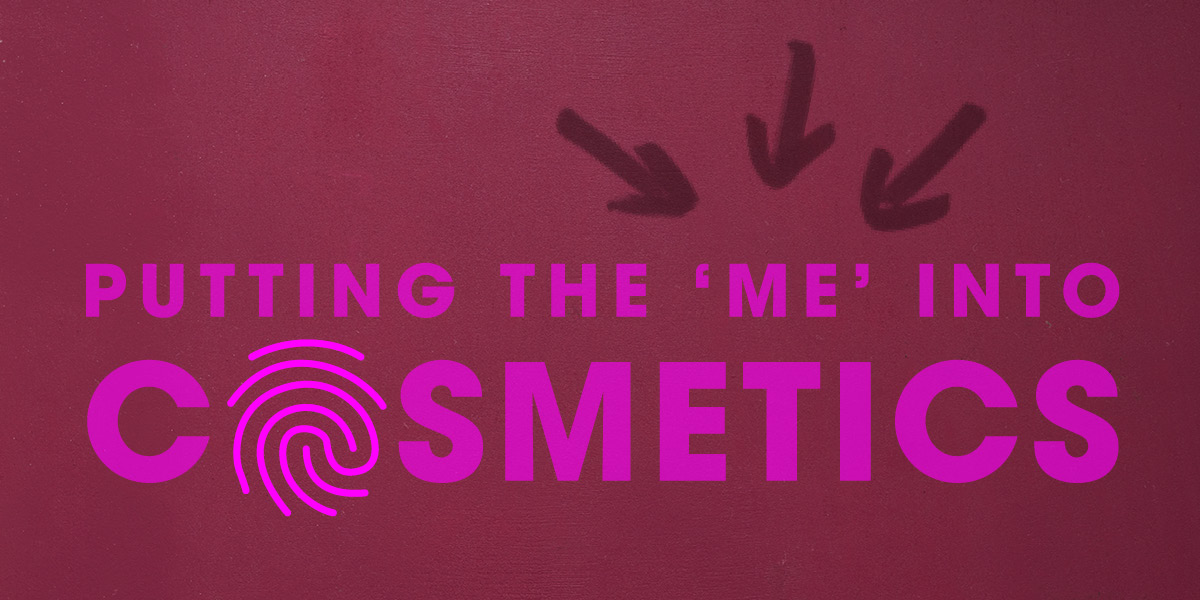Putting the ‘Me’ into Cosmetics – the rise of personalisation in beauty

Personalisation is moving from niche to normal.
The beauty industry is adapting to the ‘ME economy’ – as brands adopt more sophisticated techniques to personalise products and services. From L’Oreal’s customised makeup to DNA analysis, the rise of bespoke beauty and wellbeing shows no sign of slowing down.
As Mintel’s Beauty Online 2016 study reports, 65% of women feel overloaded with the choice on offer, amid social media endorsement by micro-influencers, celebrities and experts. Simultaneously, consumers increasingly expect a degree of customisation by brands looking to engage them – using the predictive analytics and data integration of online retailers – as a ‘shortcut’ to their individual preferences.
Personalisation, however, is more than online product curation or a monogrammed box. It’s a marketing discipline that’s underpinned by data, driven by science – but fundamentally lies in building a relationship between brand and consumer.
Affordable Luxury
Luxury brands understand this superior level of service, from dwell time in-store to delivering a sense of ‘bespoke’ – as fashion and fragrance houses know well. Tom Ford’s UK beauty store offers a VIP experience that combines sensory experience with interactive mirror AI technology. The real opportunity here, however, is communicating through what brand strategist and author Kapferer calls ‘abundant rarity’, where the core elements of luxury: exclusivity, perceived status and prestige are made more accessible by digital engagement and ‘real’ product delivery.
We see 3 areas where personalisation is being adopted as a strategy for beauty brands:
- Natural Niche
- Bespoke Science
- ME-commerce
1. Natural Niche
Emerging beauty brands have set the pace for creating intuitive, personalised offerings around specific ‘moments’ or ‘built around me’ products with a price premium to match. US ‘clean beauty’ specialist Follain encourage their customers to confide in their staff at critical times, such as early pregnancy or illness, to gently advise on skin health and natural beauty, whereas Novel Skincare have developed an elaborate, but enticing, bespoke range based on their ‘We Read You’ strapline.
‘Made for Me’ products such as Australian brand Brown Bottle extends the concept into personal care with an earthy, DIY tone of voice that challenges the mass marketing techniques of major brands and focuses on chemical-free or natural ingredients.
What differentiates these brands is their clearly alternative branding and tone of voice, designed to articulate a ‘discovery’ solution that invites a high level of data exchange and conversation.
2. Bespoke science
Premium aesthetics and ‘Harley Street’ experts are launching their own skincare ranges that are aligned to a diagnostic approach as well as their professional ethos. For example, Dr David Jack has created a range of skincare adapted from his practice consultations, whilst UK brand InsitU provides a ‘signature’, named product for each customer.
Biohacking – using in-depth tech data to build personalised nutrition and fitness programmes – takes the concept of a personal trainer to the next level. Bulletproof, for example, offer its users ‘complete control of your biology’ through a range of nutraceuticals and intense cognitive regimes.
Combining personalisation and direct access to the ‘Lab’, these brands offer the science of luxury at a price premium, with a focus on exclusivity.
3. ME-commerce
Once the sole domain of Amazon and beauty sites such as Lookfantastic, online beauty retail has become more tribal and fragmented, as subscription sites such as Birchbox mix brand curation with at-home trial. What used to be called ‘ecommerce’ has been transformed by a multi-layered online experience that includes YouTube video tutorials and vloggers, user reviews and the emergence of Hyper Social, particularly on mobile platforms such as Weibo in China.
Personalisation is a native element of online retail, but also extends to use machine learning, social listening and feedback. However, beyond tailored content, online brands need to up their game – offering exclusives, special editions and ‘pop up’ offline experiences to add a further dimension and effectively ‘humanise’ these pure play digital platforms. Creating a more individual interaction calls for an up-close approach that invites the customer to build their own personal platform and, with the implementation of GDPR, call the shots regarding how a brand uses their data, too.
In summary, personalisation is growing for two key reasons: the increasing need for brand differentiation in a saturated market; and the ‘drill down’ effect of data and predictive content, which consumers have come to expect. The real challenge is to create the unexpected and relevant, over the ‘same old’ and too familiar, perhaps.
Antony Hawman, Brand Consultant and Ecommerce specialist from ThePartnershipAtelier, sums up the opportunity:
Personalisation is key right now. We have to be as data driven as we can be and brands should be investing in their data science / analytics teams as these insights drive all new product development, buying and marketing decisions. In the climate that we’re in, this is a gift, as it means we are able to base our buying decisions on qualitative and quantitative customer feedback and shopping habits along with our sell through reports, to give the best shopping experience we can.
2018 ecommerce Beauty report
Two by Two and Magentity will publish a new ‘Beauty Digital Brand Report’ in early 2018. To be one of the first to read it, please email louise@twobytwo.co.uk.
Leave a Reply